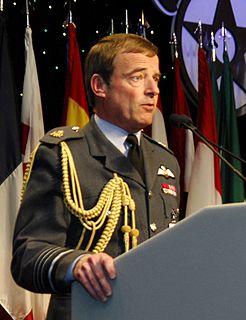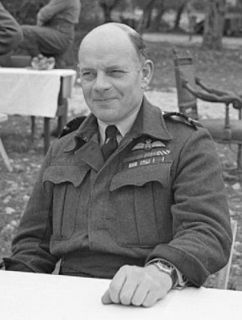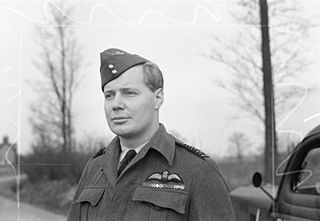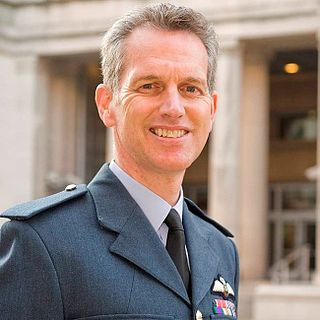Related Research Articles
Air Marshal Sir John Hugh Lapsley, was a British fighter pilot of the Second World War and, later, a senior Royal Air Force commander.
Air Chief Marshal Sir John Alexander Carlisle Aiken, was a senior Royal Air Force (RAF) officer, and the Commander of British forces in Cyprus at the time of the Turkish invasion of the island in 1974.

Marshal of the Royal Air Force Sir Andrew Henry Humphrey, was a senior officer in the Royal Air Force. He fought in the Second World War as a fighter pilot taking part in the Battle of Britain and also took part in the withdrawal from Aden in November 1967. He served as the Chief of the Air Staff advising the new Labour Government on the implementation of their latest Defence Review. He then served as Chief of the Defence Staff but caught pneumonia within three months of taking office and died shortly afterwards.
Air Marshal Sir Harold John Maguire, was a senior Royal Air Force officer and public servant. He was Director-General of Intelligence at the Ministry of Defence from 1968 to 1972.
Air Chief Marshal Sir Michael James Graydon, is a retired Royal Air Force (RAF) officer. He was a fast jet pilot in the 1960s, a squadron commander in the 1970s and a station commander in the 1980s before serving as Air Officer Commanding-in-Chief RAF Strike Command during the Gulf War. He was Chief of the Air Staff from 1992 to 1997 in which role he advised the British Government on the implementation of No Fly Zones in Iraq and Bosnia and implemented the Front Line First initiative.

Air Chief Marshal Sir Glenn Lester Torpy, is a retired senior Royal Air Force commander. He was a fast jet pilot in the late 1970s and 1980s, saw active service during the Gulf War and then went on to higher command. He was the air component commander on Operation Telic and served as Chief of the Air Staff, the professional head of the RAF, from 2006 to 2009. In that role Torpy hosted the RAF's biggest air display in two decades, and argued for consolidation of all British air power in the hands of the RAF.

Marshal of the Royal Air Force Sir William Forster Dickson, was a Royal Naval Air Service aviator during the First World War, a senior officer in the Royal Air Force during the inter-war years and a Royal Air Force commander during and after the Second World War. Dickson was Chief of the Air Staff in the mid-1950s, in which role his main preoccupation was the establishment of the V Force and the necessary supporting weapons, airfields and personnel. He also served as the first Chief of the Defence Staff in the late 1950s.

Marshal of the Royal Air Force Sir Dermot Alexander Boyle, was a senior officer in the Royal Air Force. He served in the Second World War initially as a staff officer with the Advanced Air Striking Force in Reims in which capacity he organised the evacuation of the Force through Brest in May 1940. His war service included tours as a bomber squadron commander, as a station commander and also as an air group commander. He was Chief of the Air Staff in the late 1950s and, in that role, deployed British air power during the Suez Crisis in October 1956 and defended the RAF against the views of Duncan Sandys, the Minister for Defence, who believed that the V bomber force rendered manned fighter aircraft redundant.

Marshal of the Royal Air Force Sir Thomas Geoffrey Pike, was a senior officer in the Royal Air Force. He served in the Second World War as a night fighter squadron commander and then as a station commander. He was Chief of the Air Staff in the early 1960s and, in that role, deployed British air power as part of the British response to the Brunei Revolt. Also, in the face of escalating costs, he implemented the cancellation of the British Blue Streak ballistic missile system but then found the RAF was without any such capability when the Americans cancelled their own Skybolt ballistic missile system. He went on to be Deputy Supreme Commander Supreme Headquarters Allied Powers Europe in the mid-1960s.

Marshal of the Royal Air Force Sir John Grandy, was a senior officer in the Royal Air Force. He was the only officer who fought and commanded a squadron during the Battle of Britain to reach the post of Chief of the Air Staff. In the latter role he implemented the final stages of the RAF's withdrawal from the Persian Gulf and the Far East, oversaw the ordering and subsequent cancellation of the F-111 strike aircraft and handed over Britain's nuclear deterrent role to the Royal Navy.

Marshal of the Royal Air Force Sir Denis Frank Spotswood, was a senior commander in the Royal Air Force. He fought in the Second World War as a flying boat pilot and then as a coastal reconnaissance squadron commander during Operation Torch, the invasion of North Africa. He served as a station commander in the late 1940s and early 1950s before becoming a senior air commander in the late 1950s. As the Chief of the Air Staff in the early 1970s he had a major role in implementing the defence savings demanded by the Heath Government in the face of economic difficulties at the time.
Air Marshal Sir Hector Douglas McGregor, was a senior Royal Air Force commander.
Air Chief Marshal Sir Anthony Wilkinson Heward, was a senior Royal Air Force (RAF) commander.

Air Marshal Sir Peter Guy Wykeham, was a Royal Air Force fighter pilot and squadron commander, and a flying ace of the Second World War. He was credited with 14 and 3 shared aerial victories.
Air Chief Marshal Sir Thomas Öther Prickett, was a bomber pilot in the Second World War and a senior Royal Air Force commander in the 1950s and 1960s. He was chief of staff to the air commander, Air Marshal Denis Barnett, for Operation Musketeer.
Air Chief Marshal Sir Hugh Alex Constantine, was a Royal Air Force officer who became Air Officer Commanding-in-Chief of Flying Training Command.
Air Marshal Sir Patrick Hunter Dunn, was a Royal Air Force officer who served as Air Officer Commanding-in-Chief of Flying Training Command from 1964 to 1966.
Air Marshal Christopher Mark Nickols, is a retired senior officer in the Royal Air Force, whose final appointment was Chief of Defence Intelligence. Prior to that he served as Assistant Chief of the Defence Staff (Operations).

Air Chief Marshal Sir Stephen John Hillier, is a retired senior Royal Air Force officer, who served as Chief of the Air Staff from 2016 to 2019. He was awarded the Distinguished Flying Cross for actions in the Gulf in 1999 and was awarded the United States Bronze Star Medal for service in the Iraq War. He went on to be Air Officer Commanding No. 2 Group, Director Information Superiority at the Ministry of Defence and then Deputy Chief of the Defence Staff (Capability). Hillier succeeded Air Chief Marshal Sir Andrew Pulford as Chief of the Air Staff on 12 July 2016.
Air Vice Marshal Peter John Harding, was a senior Royal Air Force officer who served as Defence Services Secretary from 1994 to 1998.
References
- ↑ "No. 40875". The London Gazette (Supplement). 7 September 1956. p. 5160.
- 1 2 3 4 5 "Air Marshal Sir John Walker". Air of Authority – A History of RAF Organisation. Retrieved 22 February 2016.
- ↑ Whitaker's Almanack 1996
| Military offices | ||
|---|---|---|
| Preceded by Sir John Kerr | Chief of Defence Intelligence 1991–1994 | Succeeded by Sir John Foley |